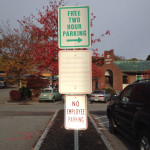
By Max Colice
A typical parking space takes up about 300 to 350 square feet. In Belmont, if you want to open a retail business or office, you’ll need one parking space per 250 square feet of retail or office space. That’s right: in Belmont, your parking lot will have to be bigger than your business. If you want to open a restaurant, you’ll need one parking space for every two seats. Again, that’s more land for parking than for people.
Providing all of this parking makes opening a business in Belmont more expensive than it should be. Consider how these requirements affect restaurants: a restaurant with 120 seats will need 60 parking spaces. If that restaurant serves lunch and dinner, six days per week, it might expect to be at full capacity for a total of five to six hours per day, or 30 to 36 hours per week. At most, those parking spaces will be completely occupied no more than 25% of the time. That restaurant will be paying for empty asphalt the rest of the week.
Likewise, minimum parking requirements, or parking minimums, make building a home more expensive than it should be because Belmont’s zoning bylaw requires two off-street parking spaces for every house, condominium, or apartment with two bedrooms or more and one off-street parking space for each one-bedroom and studio condominium or apartment. In addition to the building and the land for the building, the new homeowner must pay for parking spaces whether or not they plan to use them.
These parking minimums drive up the cost of housing. They also run counter to the spirit of the upcoming changes to Belmont’s zoning laws, which are intended to encourage multifamily housing development near public transportation stations, pushing people off the roads and onto public transportation.
Consider how parking minimums will affect Belmont when the zoning bylaws change to allow at least 1,632 new multifamily housing units. Under Belmont’s current zoning bylaw, if each of these new units has two bedrooms or more, then each unit will need two off-street parking spaces, for a total of about 22 acres of new parking.
Parking minimums are also a tremendous drag on Belmont’s property tax base and its property tax revenue. Belmont has a finite amount of land. To maximize its property tax base, Belmont should seek to promote valuable—and more profitable, from a property tax perspective—use of that land. But Belmont’s zoning bylaws force property owners to build parking, which is not valuable, instead of commercial or residential buildings, which generate much more property tax revenue.
In Belmont, if you want to open a business, you’ll need one parking space per 250 square feet of retail or office space. Your parking lot will be bigger than your business.
In addition off-street parking must be served by public roads, which are expensive to build and maintain. Off-street parking also encourages driving, which in turn causes roads to wear out faster. By requiring a minimum amount of off-street parking for each new home or business, Belmont’s zoning bylaws depress property tax revenue and incur unnecessary cost.
How can Belmont improve its situation?
The most radical approach would be to eliminate parking minimums by changing the zoning bylaw so that it no longer requires any off-street parking. A less drastic approach would be to amend the zoning bylaw to allow off-street parking within the same lot, adjacent shared parking lots, and nearby on-street parking spaces to count toward minimum parking requirements. Town Meeting could make these changes with a two-thirds majority vote..
Belmont could also allow residents and their guests to park on suitable streets overnight. Boston, Cambridge, and Somerville all allow overnight parking for residents; why not Belmont? Allowing on-street parking would free up land for residential and commercial use. It would also make streets safer by reducing traffic speeds and providing a buffer between sidewalks and moving traffic. Like Cambridge and Somerville, Belmont could even charge for annual resident parking permits—selling permits for $25 apiece could generate hundreds of thousands of dollars of revenue every year.
Again, Town Meeting could make these changes with a a two-thirds majority vote.
Belmont’s zoning bylaw requires restaurants and other businesses to provide more space for parking than for people. It also mandates a minimum amount of off-street parking for new homes. These requirements increase costs for homeowners and businesses. They also cost the public, both in terms of lost property tax revenue and higher infrastructure expenses. Ending minimum parking requirements would free land for more productive use and reduce costs for Belmont taxpayers.
Max Colice is a Belmont resident and a member of the Vision 21 Implementation Committee.


Sorry, the comment form is closed at this time.